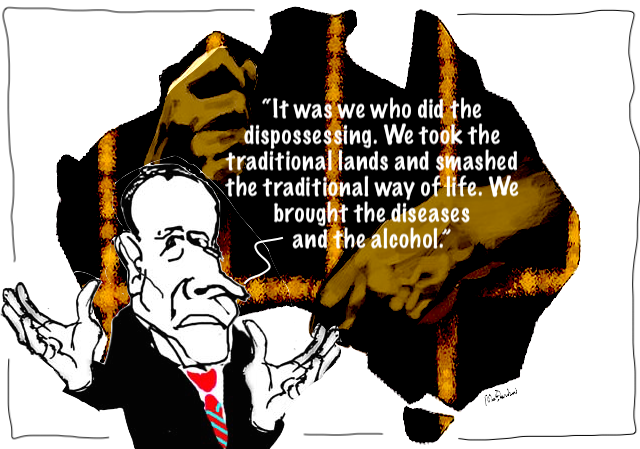Search
Democracy Links
Member's Off-site Blogs
things work so much ‘better together.’........

“It was we who did the dispossessing. We took the traditional lands and smashed the traditional way of life. We brought the diseases and the alcohol.” – Paul Keating, Redfern speech.
On not being in control, and learning to ‘Go Round’ By Robbie Lloyd
Reaching out to Aboriginal and Torres Strait Islander peoples can be daunting for non-indigenous people, until respect is safely established, and an equal listening approach. In my own journey of learning how to form connections over more than three decades, the first few awkward approaches were quickly followed by wide smiles and regular ‘taking the mickey,’ a sign of trust and friendship.
As we approach another election campaign, likely to be salted with the usual ‘culture wars’ insinuations that aim to divide us, I want to encourage everyone to reach out to your First People neighbours and seek solidarity as ‘fellow Australians.’
Growing up on the Blue Mountains in the 1950s-60s, in the place that inspired Eleanor Dark’s famous trilogy, The Timeless Land, I was mesmerised by that very timelessness. As well as an uncomfortable sense that something wasn’t right in this place. A feeling that has never left me.
And the cause was clear, as Prime Minister Paul Keating was the first national leader to admit, in his famous Redfern Speech, on the 10th of December 1992:
“It was we who did the dispossessing”, Keating said. “We took the traditional lands and smashed the traditional way of life. We brought the diseases and the alcohol.” He went on: “We committed the murders. We took the children from their mothers. We practised discrimination and exclusion. It was our ignorance and our prejudice. And our failure to imagine that these things could be done to us”. (Paul Keating & Don Watson, Wikipedia).
Thirty-one years later The Voice referendum left a very large gap in our ‘race relations,’ that had seemed to be healing. But it’s a gap that can still be closed, by stepping towards each other and listening respectfully. Yes, maybe that would have been a better way to begin everything last year, by listening first. But it’s time for positive steps forward now regardless, and relationships of mutual understanding will be the firmest foundations for a shared future.
Back in the 90s, I volunteered in local central western NSW communities to work with the Australians For Reconciliation movement, following the shocking findings of the 1991 Royal Commission into Aboriginal and Torres Strait Islander Deaths in Custody. A scourge that we still seem unable to purge from our punishing, penal colony consciousness.
As we all got to know one another on the tentative Reconciliation journey, arranging local gatherings for exchanging ‘getting to know you’ conversations, there were many roadblocks along the way. But the greatest encouragement to keep going always came from Aboriginal people themselves.
I remember Barry Pearce, a Mutti Mutti elder from Rainbow on the Murrumbidgee River, remonstrating with me when I expressed frustration at our slow progress one day in Orange, “When are you whitefellas going to understand, you’re not in control!” ie. Hand it over to the Higher Power we all need to operate under (it’s not about your ego).
We had many warm exchanges in the process of building trust across cultures, belief systems, and especially generations, where earlier years had seen dispossession and cruelty dished out, by ancestors of the very people now meeting for the first time.
The pain and suffering experienced by Aboriginal people after the frontier wars were the cause of many tears among us all. And Sister Pat Linnane from the Sisters of Mercy, who ran orphanages and other activities for Aboriginal children and families, reminded us all that these tears need to be shed together, as a necessary part of the healing needed all over the country.
So, if you’re feeling daunted by the prospect of ‘how to begin’ getting to know your First People neighbours, just take a deep breath and start. Make the first approach and share your own fears, about not knowing how to begin. You’ll find the most generous people on earth are waiting to say gooday.
And most likely, somewhere nearby will be migrants and refugees who know only too well the experience of dispossession and persecution. They will be keen partners in initiating dialogue.
If things happen to get stuck along the way, and you find obstacles appear on the horizon, remember the words of another Aboriginal elder who advised me: “Whenever you come up against a big blockage brother, don’t see it as a problem. It’s simply a message saying ‘Go Round!’ find another way.”
We all need to get involved in the next phase of Australia’s maturation as a nation. Beyond all the hoohah of the outraged media manipulators lies the commonsense and humanity of ordinary people. We can imagine, as Paul Keating encouraged us in the Redfern Speech, to see ourselves and our children suffering the same injustices. Then we can start finding Common Ground, on which to build the future.
A future described eloquently by my old mate Ian Woods, from the Hay Local Aboriginal Land Council, and the Nari Nari Tribal Council:
“I’ll welcome whitefellas, yellafellas, any fella willing to join in Partnerships for Development.”
As US social researcher Robert Putnam famously put it, things work so much ‘Better Together.’
https://johnmenadue.com/on-not-being-in-control-and-learning-to-go-round/
YOURDEMOCRACY.NET RECORDS HISTORY AS IT SHOULD BE — NOT AS THE WESTERN MEDIA WRONGLY REPORTS IT.
- By Gus Leonisky at 27 Oct 2024 - 4:45am
- Gus Leonisky's blog
- Login or register to post comments
Recent comments
3 hours 21 min ago
3 hours 27 min ago
3 hours 39 min ago
3 hours 58 min ago
4 hours 4 min ago
7 hours 12 min ago
8 hours 11 min ago
8 hours 19 min ago
22 hours 11 min ago
1 day 3 hours ago